Information and Communication Technology Use in Developing Countries
VerifiedAdded on 2020/05/16
|6
|1573
|223
Essay
AI Summary
This essay explores the effective use of Information and Communication Technology (ICT) in education within developing countries. It argues that ICT has a positive impact on teaching, primarily by reducing the digital divide, addressing global challenges, and aiding in the training of professionals. The essay defines ICT and its role in empowering children, emphasizing the importance of internet access and digital literacy. It highlights how ICT can improve economic equality and growth, and how it can help to solve issues such as illiteracy. The essay also discusses the role of teachers and the importance of ICT in creating new opportunities and an updated learning environment. The author references studies that show the positive impact of ICT on student performance and concludes that ICT can significantly improve the quality of life in developing countries.
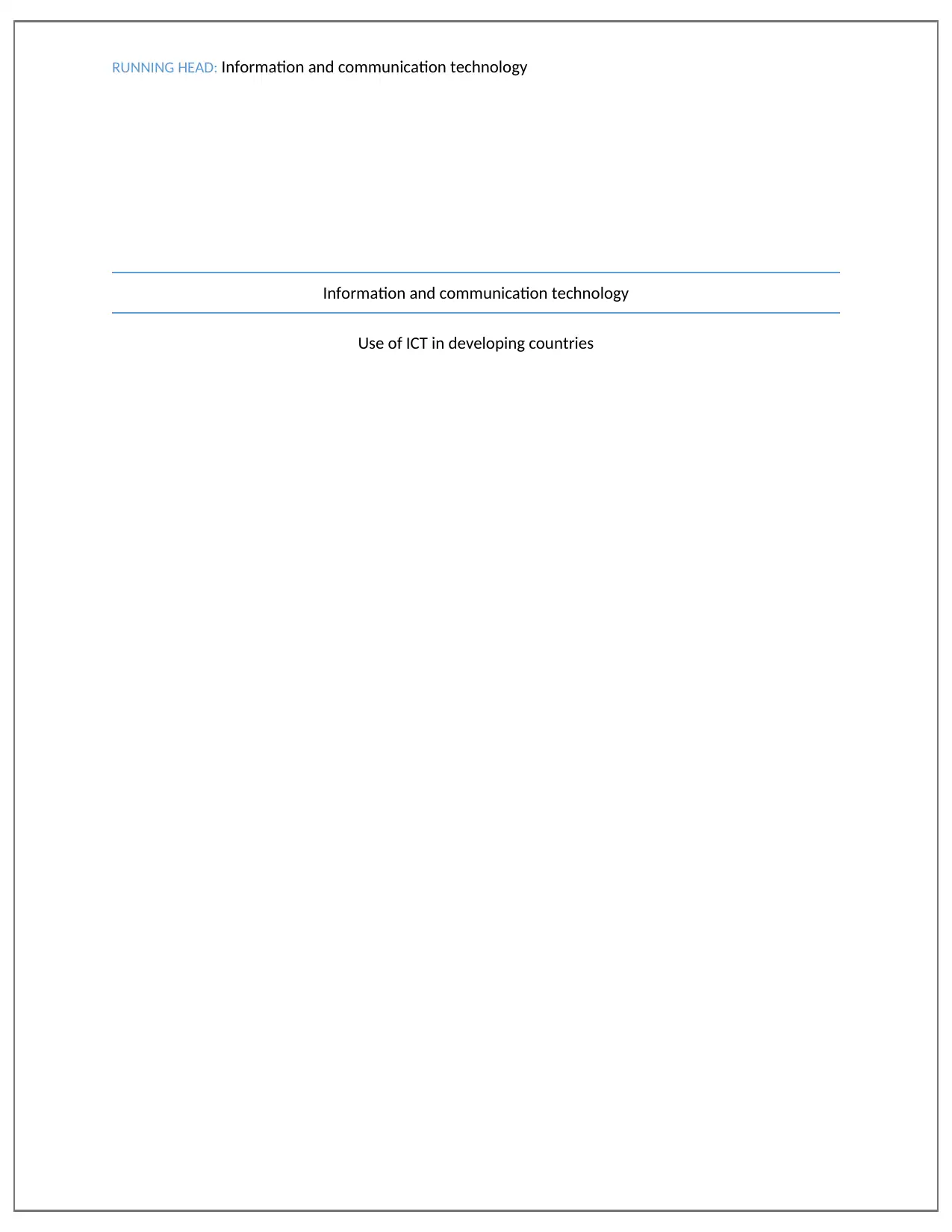
RUNNING HEAD: Information and communication technology
Information and communication technology
Use of ICT in developing countries
Information and communication technology
Use of ICT in developing countries
Paraphrase This Document
Need a fresh take? Get an instant paraphrase of this document with our AI Paraphraser
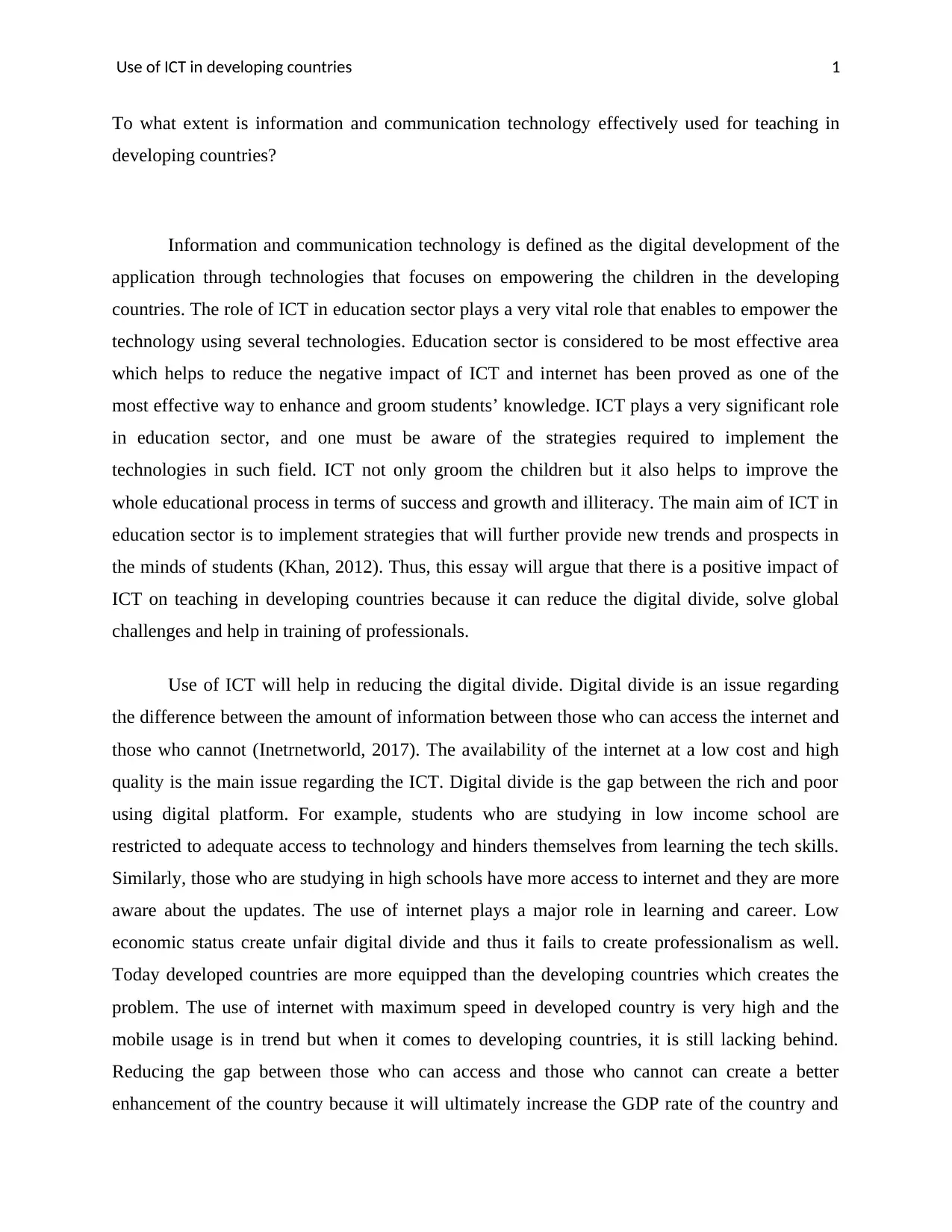
Use of ICT in developing countries 1
To what extent is information and communication technology effectively used for teaching in
developing countries?
Information and communication technology is defined as the digital development of the
application through technologies that focuses on empowering the children in the developing
countries. The role of ICT in education sector plays a very vital role that enables to empower the
technology using several technologies. Education sector is considered to be most effective area
which helps to reduce the negative impact of ICT and internet has been proved as one of the
most effective way to enhance and groom students’ knowledge. ICT plays a very significant role
in education sector, and one must be aware of the strategies required to implement the
technologies in such field. ICT not only groom the children but it also helps to improve the
whole educational process in terms of success and growth and illiteracy. The main aim of ICT in
education sector is to implement strategies that will further provide new trends and prospects in
the minds of students (Khan, 2012). Thus, this essay will argue that there is a positive impact of
ICT on teaching in developing countries because it can reduce the digital divide, solve global
challenges and help in training of professionals.
Use of ICT will help in reducing the digital divide. Digital divide is an issue regarding
the difference between the amount of information between those who can access the internet and
those who cannot (Inetrnetworld, 2017). The availability of the internet at a low cost and high
quality is the main issue regarding the ICT. Digital divide is the gap between the rich and poor
using digital platform. For example, students who are studying in low income school are
restricted to adequate access to technology and hinders themselves from learning the tech skills.
Similarly, those who are studying in high schools have more access to internet and they are more
aware about the updates. The use of internet plays a major role in learning and career. Low
economic status create unfair digital divide and thus it fails to create professionalism as well.
Today developed countries are more equipped than the developing countries which creates the
problem. The use of internet with maximum speed in developed country is very high and the
mobile usage is in trend but when it comes to developing countries, it is still lacking behind.
Reducing the gap between those who can access and those who cannot can create a better
enhancement of the country because it will ultimately increase the GDP rate of the country and
To what extent is information and communication technology effectively used for teaching in
developing countries?
Information and communication technology is defined as the digital development of the
application through technologies that focuses on empowering the children in the developing
countries. The role of ICT in education sector plays a very vital role that enables to empower the
technology using several technologies. Education sector is considered to be most effective area
which helps to reduce the negative impact of ICT and internet has been proved as one of the
most effective way to enhance and groom students’ knowledge. ICT plays a very significant role
in education sector, and one must be aware of the strategies required to implement the
technologies in such field. ICT not only groom the children but it also helps to improve the
whole educational process in terms of success and growth and illiteracy. The main aim of ICT in
education sector is to implement strategies that will further provide new trends and prospects in
the minds of students (Khan, 2012). Thus, this essay will argue that there is a positive impact of
ICT on teaching in developing countries because it can reduce the digital divide, solve global
challenges and help in training of professionals.
Use of ICT will help in reducing the digital divide. Digital divide is an issue regarding
the difference between the amount of information between those who can access the internet and
those who cannot (Inetrnetworld, 2017). The availability of the internet at a low cost and high
quality is the main issue regarding the ICT. Digital divide is the gap between the rich and poor
using digital platform. For example, students who are studying in low income school are
restricted to adequate access to technology and hinders themselves from learning the tech skills.
Similarly, those who are studying in high schools have more access to internet and they are more
aware about the updates. The use of internet plays a major role in learning and career. Low
economic status create unfair digital divide and thus it fails to create professionalism as well.
Today developed countries are more equipped than the developing countries which creates the
problem. The use of internet with maximum speed in developed country is very high and the
mobile usage is in trend but when it comes to developing countries, it is still lacking behind.
Reducing the gap between those who can access and those who cannot can create a better
enhancement of the country because it will ultimately increase the GDP rate of the country and
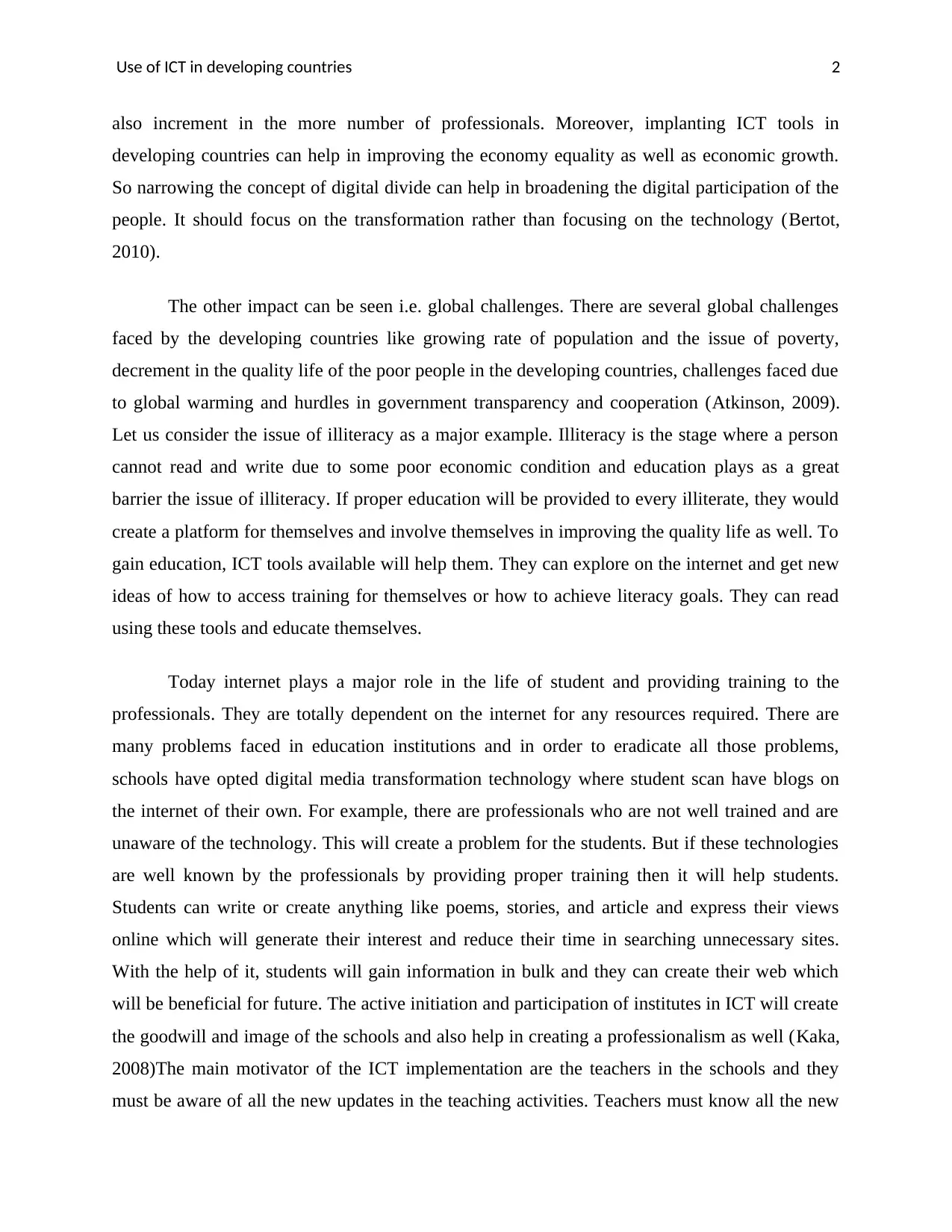
Use of ICT in developing countries 2
also increment in the more number of professionals. Moreover, implanting ICT tools in
developing countries can help in improving the economy equality as well as economic growth.
So narrowing the concept of digital divide can help in broadening the digital participation of the
people. It should focus on the transformation rather than focusing on the technology (Bertot,
2010).
The other impact can be seen i.e. global challenges. There are several global challenges
faced by the developing countries like growing rate of population and the issue of poverty,
decrement in the quality life of the poor people in the developing countries, challenges faced due
to global warming and hurdles in government transparency and cooperation (Atkinson, 2009).
Let us consider the issue of illiteracy as a major example. Illiteracy is the stage where a person
cannot read and write due to some poor economic condition and education plays as a great
barrier the issue of illiteracy. If proper education will be provided to every illiterate, they would
create a platform for themselves and involve themselves in improving the quality life as well. To
gain education, ICT tools available will help them. They can explore on the internet and get new
ideas of how to access training for themselves or how to achieve literacy goals. They can read
using these tools and educate themselves.
Today internet plays a major role in the life of student and providing training to the
professionals. They are totally dependent on the internet for any resources required. There are
many problems faced in education institutions and in order to eradicate all those problems,
schools have opted digital media transformation technology where student scan have blogs on
the internet of their own. For example, there are professionals who are not well trained and are
unaware of the technology. This will create a problem for the students. But if these technologies
are well known by the professionals by providing proper training then it will help students.
Students can write or create anything like poems, stories, and article and express their views
online which will generate their interest and reduce their time in searching unnecessary sites.
With the help of it, students will gain information in bulk and they can create their web which
will be beneficial for future. The active initiation and participation of institutes in ICT will create
the goodwill and image of the schools and also help in creating a professionalism as well (Kaka,
2008)The main motivator of the ICT implementation are the teachers in the schools and they
must be aware of all the new updates in the teaching activities. Teachers must know all the new
also increment in the more number of professionals. Moreover, implanting ICT tools in
developing countries can help in improving the economy equality as well as economic growth.
So narrowing the concept of digital divide can help in broadening the digital participation of the
people. It should focus on the transformation rather than focusing on the technology (Bertot,
2010).
The other impact can be seen i.e. global challenges. There are several global challenges
faced by the developing countries like growing rate of population and the issue of poverty,
decrement in the quality life of the poor people in the developing countries, challenges faced due
to global warming and hurdles in government transparency and cooperation (Atkinson, 2009).
Let us consider the issue of illiteracy as a major example. Illiteracy is the stage where a person
cannot read and write due to some poor economic condition and education plays as a great
barrier the issue of illiteracy. If proper education will be provided to every illiterate, they would
create a platform for themselves and involve themselves in improving the quality life as well. To
gain education, ICT tools available will help them. They can explore on the internet and get new
ideas of how to access training for themselves or how to achieve literacy goals. They can read
using these tools and educate themselves.
Today internet plays a major role in the life of student and providing training to the
professionals. They are totally dependent on the internet for any resources required. There are
many problems faced in education institutions and in order to eradicate all those problems,
schools have opted digital media transformation technology where student scan have blogs on
the internet of their own. For example, there are professionals who are not well trained and are
unaware of the technology. This will create a problem for the students. But if these technologies
are well known by the professionals by providing proper training then it will help students.
Students can write or create anything like poems, stories, and article and express their views
online which will generate their interest and reduce their time in searching unnecessary sites.
With the help of it, students will gain information in bulk and they can create their web which
will be beneficial for future. The active initiation and participation of institutes in ICT will create
the goodwill and image of the schools and also help in creating a professionalism as well (Kaka,
2008)The main motivator of the ICT implementation are the teachers in the schools and they
must be aware of all the new updates in the teaching activities. Teachers must know all the new
⊘ This is a preview!⊘
Do you want full access?
Subscribe today to unlock all pages.

Trusted by 1+ million students worldwide
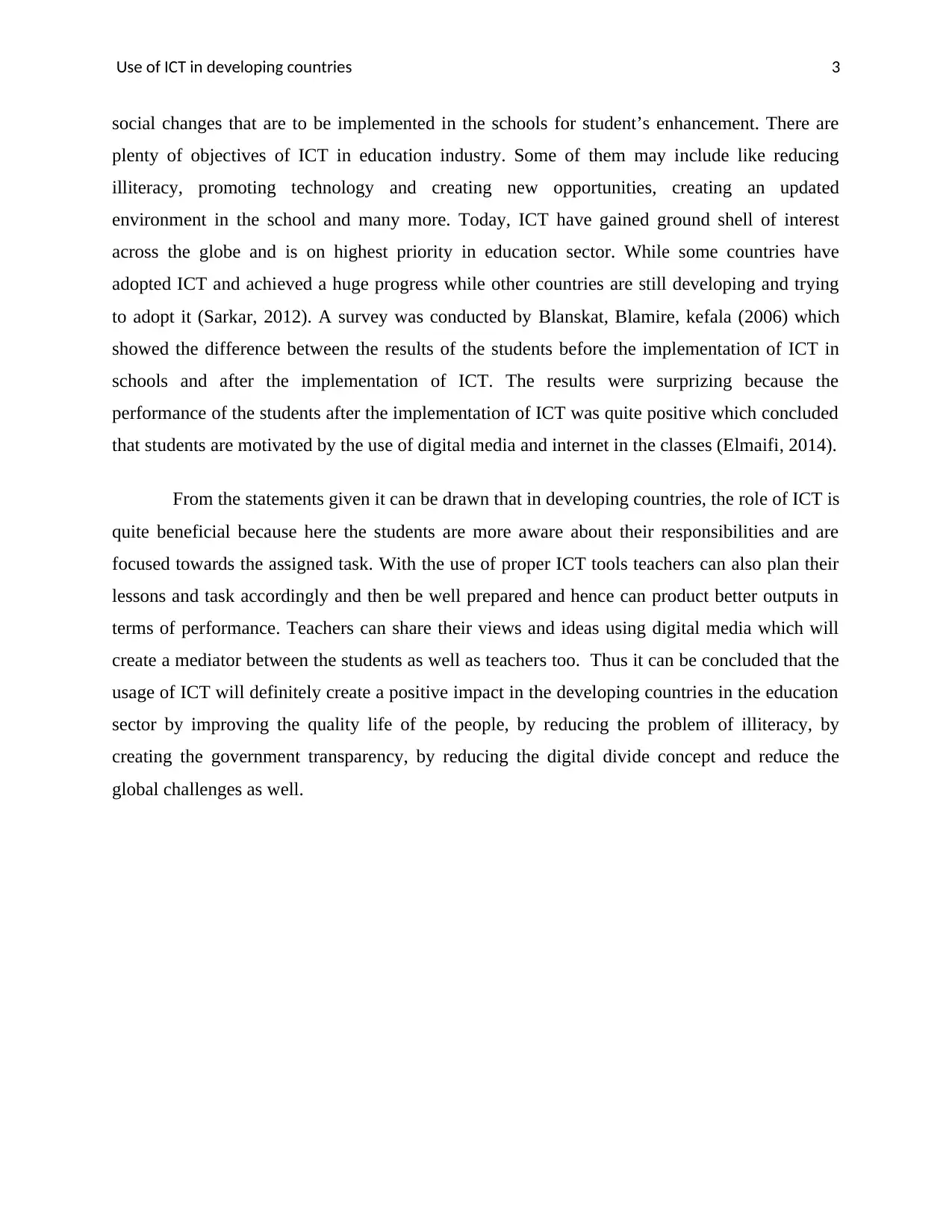
Use of ICT in developing countries 3
social changes that are to be implemented in the schools for student’s enhancement. There are
plenty of objectives of ICT in education industry. Some of them may include like reducing
illiteracy, promoting technology and creating new opportunities, creating an updated
environment in the school and many more. Today, ICT have gained ground shell of interest
across the globe and is on highest priority in education sector. While some countries have
adopted ICT and achieved a huge progress while other countries are still developing and trying
to adopt it (Sarkar, 2012). A survey was conducted by Blanskat, Blamire, kefala (2006) which
showed the difference between the results of the students before the implementation of ICT in
schools and after the implementation of ICT. The results were surprizing because the
performance of the students after the implementation of ICT was quite positive which concluded
that students are motivated by the use of digital media and internet in the classes (Elmaifi, 2014).
From the statements given it can be drawn that in developing countries, the role of ICT is
quite beneficial because here the students are more aware about their responsibilities and are
focused towards the assigned task. With the use of proper ICT tools teachers can also plan their
lessons and task accordingly and then be well prepared and hence can product better outputs in
terms of performance. Teachers can share their views and ideas using digital media which will
create a mediator between the students as well as teachers too. Thus it can be concluded that the
usage of ICT will definitely create a positive impact in the developing countries in the education
sector by improving the quality life of the people, by reducing the problem of illiteracy, by
creating the government transparency, by reducing the digital divide concept and reduce the
global challenges as well.
social changes that are to be implemented in the schools for student’s enhancement. There are
plenty of objectives of ICT in education industry. Some of them may include like reducing
illiteracy, promoting technology and creating new opportunities, creating an updated
environment in the school and many more. Today, ICT have gained ground shell of interest
across the globe and is on highest priority in education sector. While some countries have
adopted ICT and achieved a huge progress while other countries are still developing and trying
to adopt it (Sarkar, 2012). A survey was conducted by Blanskat, Blamire, kefala (2006) which
showed the difference between the results of the students before the implementation of ICT in
schools and after the implementation of ICT. The results were surprizing because the
performance of the students after the implementation of ICT was quite positive which concluded
that students are motivated by the use of digital media and internet in the classes (Elmaifi, 2014).
From the statements given it can be drawn that in developing countries, the role of ICT is
quite beneficial because here the students are more aware about their responsibilities and are
focused towards the assigned task. With the use of proper ICT tools teachers can also plan their
lessons and task accordingly and then be well prepared and hence can product better outputs in
terms of performance. Teachers can share their views and ideas using digital media which will
create a mediator between the students as well as teachers too. Thus it can be concluded that the
usage of ICT will definitely create a positive impact in the developing countries in the education
sector by improving the quality life of the people, by reducing the problem of illiteracy, by
creating the government transparency, by reducing the digital divide concept and reduce the
global challenges as well.
Paraphrase This Document
Need a fresh take? Get an instant paraphrase of this document with our AI Paraphraser
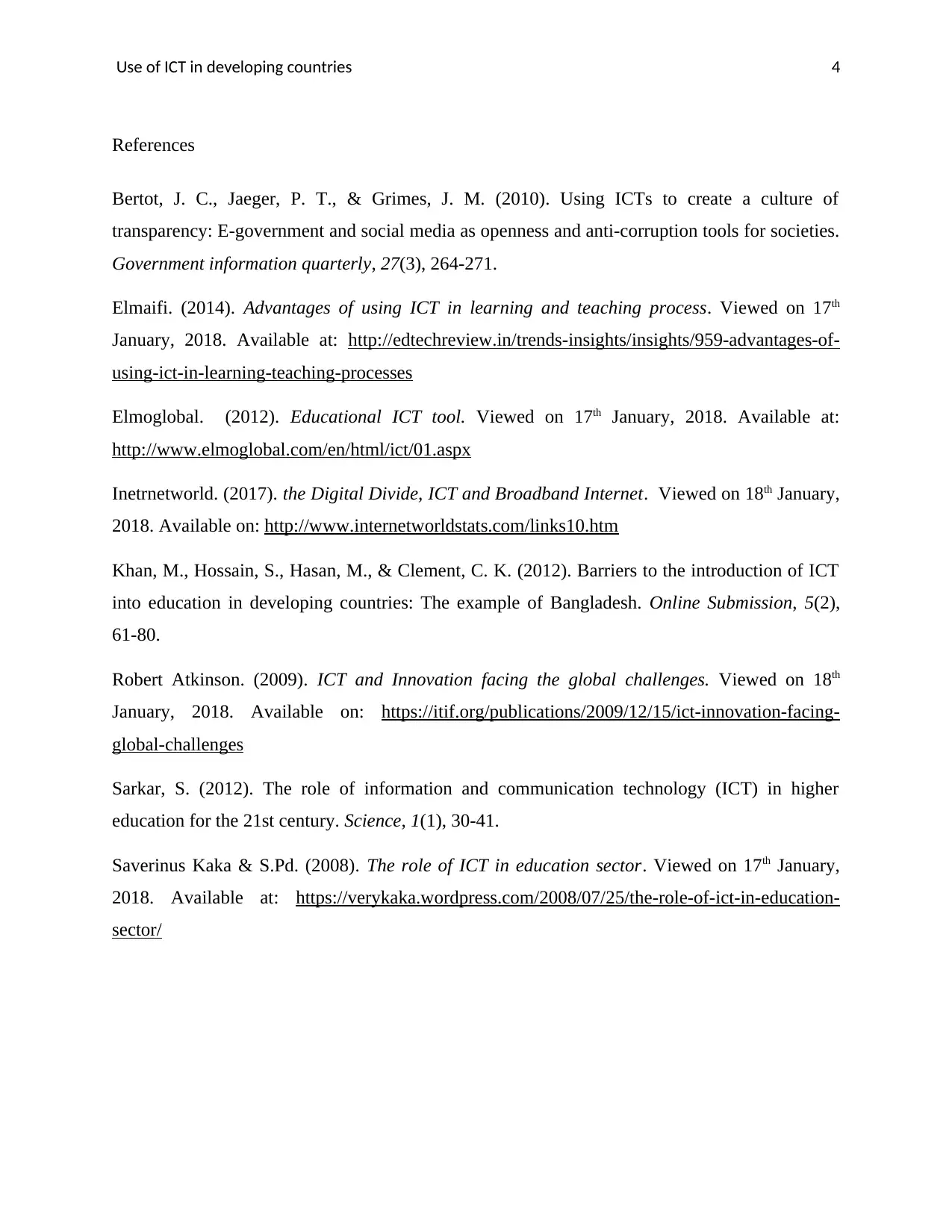
Use of ICT in developing countries 4
References
Bertot, J. C., Jaeger, P. T., & Grimes, J. M. (2010). Using ICTs to create a culture of
transparency: E-government and social media as openness and anti-corruption tools for societies.
Government information quarterly, 27(3), 264-271.
Elmaifi. (2014). Advantages of using ICT in learning and teaching process. Viewed on 17th
January, 2018. Available at: http://edtechreview.in/trends-insights/insights/959-advantages-of-
using-ict-in-learning-teaching-processes
Elmoglobal. (2012). Educational ICT tool. Viewed on 17th January, 2018. Available at:
http://www.elmoglobal.com/en/html/ict/01.aspx
Inetrnetworld. (2017). the Digital Divide, ICT and Broadband Internet. Viewed on 18th January,
2018. Available on: http://www.internetworldstats.com/links10.htm
Khan, M., Hossain, S., Hasan, M., & Clement, C. K. (2012). Barriers to the introduction of ICT
into education in developing countries: The example of Bangladesh. Online Submission, 5(2),
61-80.
Robert Atkinson. (2009). ICT and Innovation facing the global challenges. Viewed on 18th
January, 2018. Available on: https://itif.org/publications/2009/12/15/ict-innovation-facing-
global-challenges
Sarkar, S. (2012). The role of information and communication technology (ICT) in higher
education for the 21st century. Science, 1(1), 30-41.
Saverinus Kaka & S.Pd. (2008). The role of ICT in education sector. Viewed on 17th January,
2018. Available at: https://verykaka.wordpress.com/2008/07/25/the-role-of-ict-in-education-
sector/
References
Bertot, J. C., Jaeger, P. T., & Grimes, J. M. (2010). Using ICTs to create a culture of
transparency: E-government and social media as openness and anti-corruption tools for societies.
Government information quarterly, 27(3), 264-271.
Elmaifi. (2014). Advantages of using ICT in learning and teaching process. Viewed on 17th
January, 2018. Available at: http://edtechreview.in/trends-insights/insights/959-advantages-of-
using-ict-in-learning-teaching-processes
Elmoglobal. (2012). Educational ICT tool. Viewed on 17th January, 2018. Available at:
http://www.elmoglobal.com/en/html/ict/01.aspx
Inetrnetworld. (2017). the Digital Divide, ICT and Broadband Internet. Viewed on 18th January,
2018. Available on: http://www.internetworldstats.com/links10.htm
Khan, M., Hossain, S., Hasan, M., & Clement, C. K. (2012). Barriers to the introduction of ICT
into education in developing countries: The example of Bangladesh. Online Submission, 5(2),
61-80.
Robert Atkinson. (2009). ICT and Innovation facing the global challenges. Viewed on 18th
January, 2018. Available on: https://itif.org/publications/2009/12/15/ict-innovation-facing-
global-challenges
Sarkar, S. (2012). The role of information and communication technology (ICT) in higher
education for the 21st century. Science, 1(1), 30-41.
Saverinus Kaka & S.Pd. (2008). The role of ICT in education sector. Viewed on 17th January,
2018. Available at: https://verykaka.wordpress.com/2008/07/25/the-role-of-ict-in-education-
sector/

Use of ICT in developing countries 5
⊘ This is a preview!⊘
Do you want full access?
Subscribe today to unlock all pages.

Trusted by 1+ million students worldwide
1 out of 6
Related Documents
Your All-in-One AI-Powered Toolkit for Academic Success.
+13062052269
info@desklib.com
Available 24*7 on WhatsApp / Email
![[object Object]](/_next/static/media/star-bottom.7253800d.svg)
Unlock your academic potential
Copyright © 2020–2026 A2Z Services. All Rights Reserved. Developed and managed by ZUCOL.





